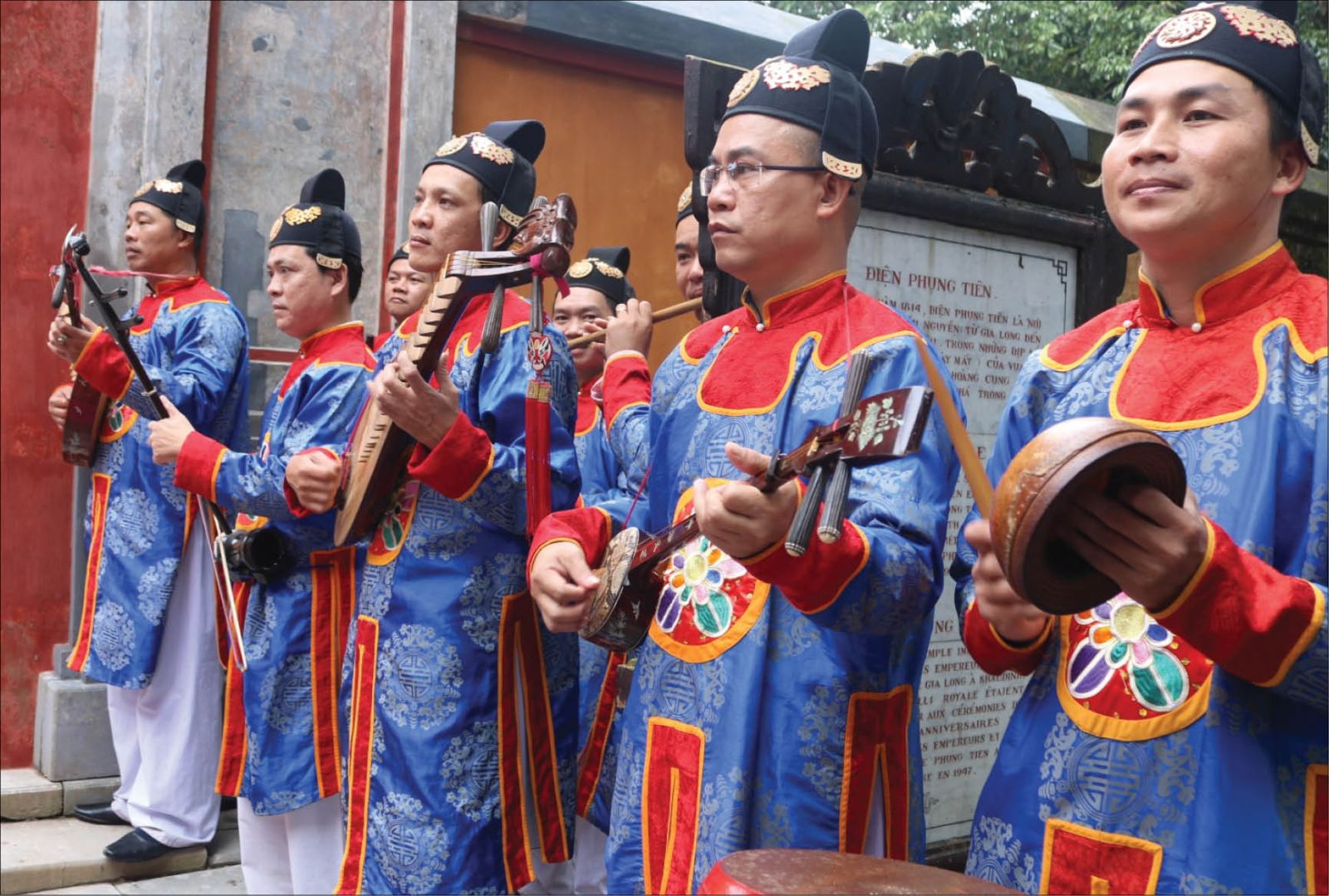
Court music instrumentalists in an event at the Imperial City
Versatile
Hue Traditional Royal Theatre of Art (belonging to Hue Monuments Conservation Center) has about 50 instrumentalists, both male and female. While most of the male artists play court music, including dai nhac (for big ceremonies) and tieu nhac (for smaller events), the female artists mainly accompany royal dancing, tuong (classical drama) and ca Hue (Hue singing.)
“Versatile” is what Phan Thi Bach Hac, People’s Artist and Director of Hue Traditional Royal Theatre of Art, briefly says about her instrumentalists. They are versatile because besides their majors at school, while working for the theater, they have to teach themselves 1-2 other musical instruments to play in the orchestra.
Today, court music also accompanies classical drama, royal dancing and Hue singing. Instrumentalists of the theatre must hence master the court music which has been collected and restored and the music for royal dancing and classical drama. To be able to do so, they must have had to practice regularly for many years.
Only when the instrumentalists remember and absorb all the branches of court music can they be confident to play accurately in a Hueish manner.
The team of instrumentalists at Hue Traditional Royal Theatre of Art is different from that of many other traditional art theaters in the country in that they themselves compose and play for classical drama at festivals.
To be able to support actors and actresses, instrumentalists have to practice a lot. While actors and actresses learn by heart their own parts only, instrumentalists must remember the whole play and know well the performance of all the characters.
As Vice-Director of Hue Traditional Royal Theatre of Art, Hoang Trong Cuong composes background music for classical drama for the theater. Hoang Trong Cuong learnt dan bau (monochord) at school, but working for the theatre, he had chances to study and work with many prominent figures in music. He now can play well ty ba (a kind of Vietnamese lute), nguyet (double-stringed lute) and tam (zither).
“The more one plays court music, the more one feels like it. For each instrumentalist, the knowledge of music at school only is not sufficient. One has to train his performing skills. At present, of about 50 players of the theatre, only one-third are really good. They can remember and play any song well. The rest is studying and taking hands-on training syllabus,” says Hoang Trong Cuong.
Hand shaking with Japanese Emperor
Like elsewhere, court music is considered the soul of traditional court performing art. Despite its important role, most of the work by instrumentalists is unknown. Court instrumentalists are thus in a disadvantageous position.
But in return, Hue court music instrumentalists can take pride in introducing the beauty of the national music to international friends, especially to people from similar cultures such as Japanese, Korean, etc.
Up to now, few traditional art theaters in Vietnam had honor to perform twice for Japanese Emperor Akihito and Queen Michiko. The first time was in Japan in 2009 and the second time was right in the Ancient Capital of Hue.
Loving court music, Japanese people love instrumentalists who play it. After the performance, the instrumentalists were asked to step forwards to shake hands with the King and Queen and to receive flowers from them.
Visiting Vietnam in 2017, Japanese King Akihito and Queen saved some time to visit Hue to watch the show of court music that had been once performed in Japan. It was a very short show. But when it ended, the King and Queen stayed to shake hands with the instrumentalists. Some even had another chance.
“As a formal routine, the King shakes hands with heads of state and very important persons only and bows to others. The fact that he shook hands with the instrumentalists showed his love and friendliness for them. For the instrumentalists, it was such an honor and they deserved it. It gave them motivation to continue with their job. Our theatre is very proud to have them. Thanks to them, the theatre can fulfill the duty of conserving and promoting the cultural value of court music,” said Bach Hac with emotion.
Story and photo: Dong Van